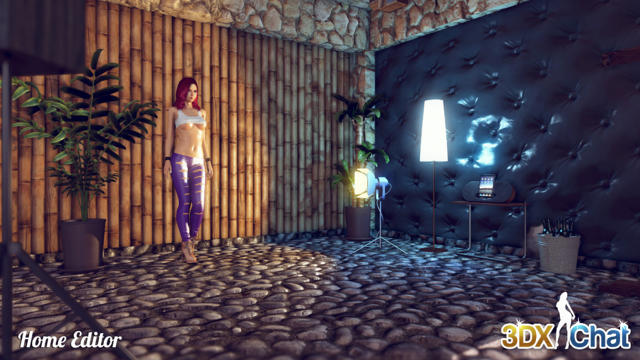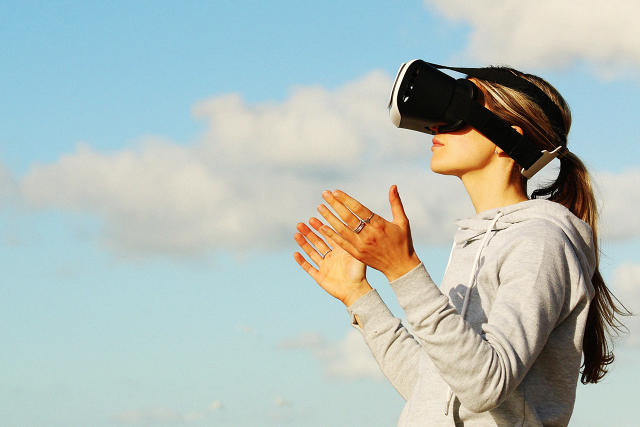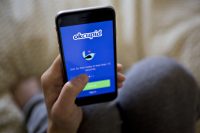Here’s What Dating Tech Will Look Like In 2017
Every year, we reach new heights in dating technology, as apps, platforms, and gadgets become more deeply entangled in our relationships. No doubt, dating in 2017 will not be materially different from what it was like in 2016—a year tends not to make a lot of difference—but we can certainly glean a picture of what sex and love will look like in the not-so-distant future and beyond.
In a way, pop culture is already showing us. One of the most acclaimed TV dramas of the year, HBO’s Westworld, is set in an enormous Dionysian amusement park in which humans indulge their sexual and emotional fantasies with lifelike robots. We’re not there yet, but this past April, a Hong Kong designer unveiled his very own humanoid robot that looked remarkably similar to actress Scarlett Johansson. This blond-haired, green-eyed clone—the tinkerings of a hobbyist—was made from silicon, plastic, and circuit boards rather than flesh and blood. Though she wasn’t outfitted with artificial intelligence, the soft construction of her face and slight gape of her pouty pink lips are so nearly real that a world populated by Westworld-like robots doesn’t feel far off.
In the meantime, adventurous love-seekers can explore many technologies that are emerging right now.
VR Gets Sexual
Headsets took off in 2016, with launches from Oculus Rift, Vive, Daydream View, and PS VR. And while initial sales were deemed low, the technology is still gaining traction. As Stephanie Lamas, director of research for Superdata, noted at the VRX Conference in San Francisco, 16 million people will be using virtual reality by the end of the year. Naturally, the two earliest arrivals to the VR scene are gamers and pornographers.
The abundance of VR equipment has spawned both virtual-reality porn platforms and adults-only social networks. Porn sites like Camsoda, BaDoinkVR, and Naughty America are all encouraging us to strap a headset to our face and try out the latest in masturbation tech. To accompany you on your journey are familiar tools revamped for the virtual-reality era. Fleshlights have morphed into mechanical twerking butts, phone sex has given way to teledildonics, and soon blow-up dolls will be AI-enhanced Realdolls. And there’s more. Just last month, CamSoda debuted a catalog of virtual blow jobs, which replicate the feeling (via a connected “sleeve”) of a cam girl fellating a smart dildo.
Who Do You Want To Be?
Role-playing games are cropping up as a sort of preamble to virtual dating. 3Dxchat, a subscription multiplayer game, is at its core a virtual sex party. Avatars meet avatars, chat, and sneak off into rooms to act out graphic animated sex. It’s not unlike how people meet in other multiplayer role-playing games like Minecraft and World of Warcraft. But with 3Dxchat the intentions are more explicit and the visuals more in-your-face.

Unfortunately, we also learned this year that women can expect to be harassed and impinged with unsolicited advances in virtual reality, just like they do in actual reality. In April, Fusion’s Kevin Roose called out AltspaceVR for the sexually aggressive behavior against women that takes place on its platform.
Another scary aspect of digital dating is the growing amount of data that companies are collecting about your most personal interactions. According to a May article from Marie Claire, some apps may soon use that information to create your digital likeness in the form of online avatars that can respond for you. Not just respond, but field first dates.
Companies like Netflix and Foursquare have long cultivated personal data to feed their recommendation engines, and so it’s only natural that dating apps would follow suit, slurping up consumer behavior to automate more components of their overall experiences. Consider Tinder’s individual desirability rating. The company is attempting to quantify what makes a person attractive, most likely in pursuit of making better matches. But this system could eventually be tailored to an individual so that Tinder understands how you would quantify a person’s attractiveness. Leaping ahead, with enough behavioral data, machine learning could mimic your personality and handle lightweight social interactions on your behalf.
Niche No More
Whatever lies ahead, one thing is pretty clear: A majority of people are now open to meeting other people online. According to a Pew Research survey from February, 59% of Americans say online dating is a good way to meet someone, up from 44% a decade ago. Among young adults, the use of dating websites or mobile apps has tripled since 2013.
As people increasingly seek out online forms of dating, the options for finding love and lust are getting more diverse. This growth has allowed niche dating apps like Wing Ma’m or Her to attract larger followings. And though it’s far from a blossoming field, meet-up apps catering to married or otherwise entwined couples are proving resilient, even in the face of big setbacks: Adultery website Ashley Madison is down but not out after being slapped with a $1.65 million fine for failing to provide full account deletion services after customers paid for it. The company’s website still appears to be attracting traffic even after a massive hack sidelined the business, according to Alexa. Alternatively, the recently renamed Feeld helps triangulate threesomes for couples who are monogamish. There will no doubt be more of these kinds of communities to come.
To some, the proliferation of dating tech has heralded a kind of “dating apocalypse,” as Vanity Fair’s Nancy Jo Sales coined it in 2015. But I’d offer a different perspective. Rather than obliterating the dating scene as we know it, tech has opened up a bevy of new options to sate our various tastes. Dating is no longer a one-size-fits-all game. And while hookup culture may seem like an exhausting, unwanted guest who forever overextends his welcome, let’s remember we invited him over in the first place.

Involuntary Polyamory
The movement toward normalizing casual sex has been inching forward over the last 60 years, according to a 2012 study. It’s not so much that sex has become more of a priority than dating or love, it’s that the separation of sex and love is becoming more and more acceptable in popular culture.
Shifting attitudes around sex, dating, and marriage have paved the way for a sort of involuntary polyamory. In her recently published book Future Sex, author Emily Witt explores this concept through the eyes of a character named Elizabeth, who juggles multiple paramours. Elizabeth doesn’t subscribe to the ideology of polyamory, but she nevertheless finds herself in a sort of polyamorish circumstance—one that is common to lots of millennials in 2016.
What this all means is that there’s a bubbling array of ways to indulge your curiosities now and going forward, and the internet and social platforms play an integral role in surfacing the kind of content we’re most interested in. As Witt explores these endless possibilities, she eventually digs into orgasmic meditation—an intimate yet desexualized interaction wherein a latex-gloved person strokes a woman’s genitals for 15 minutes. As a resident of San Francisco, Witt is probably as just as likely to have come to this practice by way of a sandwich board as a Reddit thread, but for those not in proximity to such a facility, there’s easily accessible information spread all over the web.
In all these endeavors—whether it’s Reddit sex threads, VR role-playing games, teledildonics, or Tinder—what we seem to be striving for is real-life intimacy, or at least the closest simulation we can possibly get. That doesn’t mean people don’t still want love. As Tinder founder Sean Rad said at the New Yorker Festival in October, “If you ask our users, over 80% say they want a long-term relationship.”
So dating tech isn’t necessarily the enemy. Rather, it’s a means to help us figure out what we want and provide us the paths to get it, for better or worse. Tech never happens in a vacuum, after all. And while it shapes the world we live in and the way we behave, innovation tends to facilitate our aspirations—the way we want things to be. When entrepreneur Cindy Gallop was unable to find porn she felt was relevant to her, she made Make Love Not Porn, a platform, and filled it with homemade sex tapes to help teach people what real sex looks like.
There’s always opportunity for good with tech. In 2017, we’ll still be grappling around in the dark and under sheets, looking for answers that are rarely in the place we think they should be. But maybe, little by little, tech will help shed a smartphone’s worth of light on what future dating should look like.
Fast Company , Read Full Story
(12)












